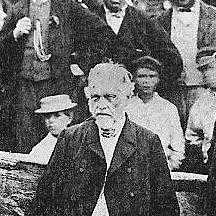Crawshay Bailey
| Crawchay Bailey | |
|---|---|
 | |
| Born |
1789 Great Wenham |
| Died | 1872 |
| Occupation | Ironmaster |
Crawshay Bailey (1789 – 9 January, 1872) was an English industrialist who became one of the great iron-masters of Wales.
Early life
Bailey was born in 1789 in Great Wenham, Suffolk, the son of John Bailey, of Wakefield and his wife Susannah. His parents had moved from Normanton, near Wakefield in around 1780 by which time they had already had at least three children (Ann, Elizabeth and William). Crawshay was the youngest of a further five children to be born in Great Wenham (the others being Susan, Joseph, John, and Thomas). His mother, Susannah was the sister of Richard Crawshay, the Ironmaster based at Cyfarthfa Castle near Merthyr Tydfil where Crawshay Bailey came at the age of twelve to work for his rich uncle in 1801, joining his elder brother Joseph. In 1809 he was a witness to his rich uncle's will, in which he was bequeathed the sum of £1,000 (equivalent to £55,000 in today's terms 2007 ).
Business career
Along with his elder brother, Joseph, later Sir Joseph Bailey, 1st Baronet, Crawshay went into the iron business as a young man in 1811 at Nantyglo and soon at Beaufort, Ebbw Vale. He became a Partner, with his brother in 1820.
For a time he also ran the ironworks at Rhymney, and while there he constructed a tramway between Rhymney and Bassaleg near Newport.
Though by now a major ironmaster he far-sightedly bought up large areas of coal-rich land, at their agricultural value too, in the Rhondda Valleys, at Mountain Ash and Aberaman and was prepared to sit on these assets for nearly nine years before developing them as some of the richest coal and iron ore deposits in the world.
In a similar manner he waited until the most auspicious time before applying for a Parliamentary Act to open and run a railway company. In 1845 he was instrumental in setting up the Aberdare Railway, along with Sir John Josiah Guest to capitalise on further assets in the form of sinking new collieries and building new blast furnaces.
He also promoted railways between Coleford, in the Forest of Dean, via Monmouth and Usk to Pontypool.
He was anti trade union and opposed to his workers organising themselves along these lines.
Political career
He had already been appointed High Sheriff of Brecknockshire in 1837 and also held the same office in Monmouthshire in 1850. He was Member of Parliament for Monmouth Boroughs from 1852 to 1868 and was elected in five successive parliamentary elections.
Later life
By 1867 he owned iron works, blast furnaces, coalmines, tramways, railways and brickworks. He retired in this year, selling off all his assets over the next three years. Before 1851 he had retired to Llanfoist near Abergavenny, where he lived in Llanfoist House. A local park in Abergavenny town is named Bailey Park in his honour and Llanfoist Primary School had a house named after him.
He died in 1872, aged 83, after at least seventy years in industry. His only son, and heir, Crawshay Bailey II (born 1821), inherited.
Popular culture
Crawshay Bailey was the original subject of the song now usually corrupted to Cosher Bailey
Crawshay Bailey had an Engine
It was always needin' mendin'
And dependin' on its power
It could do four miles an hour
Did you ever saw
Did you ever saw
Did you ever saw
Such a funny thing before?
(and so on—many, many verses in different versions) [1]
Sources
References
- ↑ Robert Graves: Goodbye to all that
External links
- Hansard 1803–2005: contributions in Parliament by Crawshay Bailey
| Parliament of the United Kingdom | ||
|---|---|---|
| Preceded by Reginald Blewitt |
Member of Parliament for Monmouth Boroughs 1852–1868 |
Succeeded by Sir John Ramsden |
| Honorary titles | ||
| Preceded by John Lloyd Vaughan Watkins |
High Sheriff of Brecknockshire 1837 |
Succeeded by James Thomson |
| Preceded by John Arthur Edward Herbert |
High Sheriff of Monmouthshire 1851 |
Succeeded by Ferdinand Hanbury-Williams |